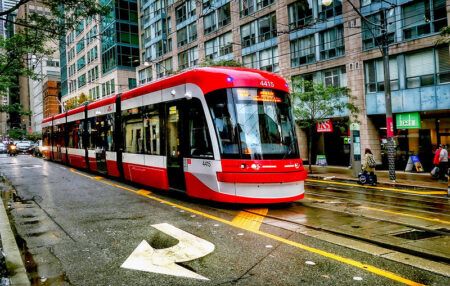The US Department of Transportation’s (USDOT) Bureau of Transportation Statistics (BTS) has released a geospatial database containing the information submitted by almost 200 transit agencies that provides open, machine-readable data about their stops, routes, and schedules.
The BTS National Transit Map data is an openly available map of fixed-guideway and fixed-route transit service in the USA that will allow the USDOT to demonstrate the importance and role of transit in American society, and to identify and address gaps in access to public transportation. It will also support research, planning and analysis on the benefits of transit, such as the economic impacts of transit on a community’s economic development, or on reducing poverty in low-income neighborhoods. The national Transit Map can be used to support USDOT’s ‘Ladders of Opportunity’ initiative to promote the use of existing transportation networks to connect residents to jobs, education, health, government, and other essential services.
The initial National Transit Map consists of General Transit Feed Specification (GTFS) data feeds registered with BTS in response to a March 2016 request for the data from US Transportation Secretary Anthony Foxx. Almost 200 transit agencies responded, submitting data on over 385,000 stops and stations, and nearly 10,000 routes. Development of the National Transit Map is a continuing process and another update is expected to be released by the end of 2016. The first version of the National Transit Map contains data for 84% of the top 25 urban transit agencies with fixed route service, 74% of the top 50 agencies, and approximately one-third of all urban transit agencies with fixed route service. USDOT is currently working to bring additional transit agencies on board for the second version of the map, which is scheduled to be released in late 2016.
BTS has worked jointly with the Federal Transit Administration (FTA) and the USDOT’s Office of the Chief Information Officer to develop and release the inaugural map. The National Transit Map includes the National Transit Layer national data feeds that provide open, machine readable spatial and tabular data about the USA’s transit systems stops, routes, and schedules. It also has a National Participation Map that shows which agencies have volunteered to take part in the National Transit Map. In addition, Interactive Mapping Apps that provide tools such as calculators for distances from transit stops, trip frequency and time of day coverage, will be released shortly.
The National Transit Map will be a National Geospatial Data Asset (NGDA) within the National Transportation Atlas Database (NTAD), a set of nationwide geographic databases of transportation facilities, networks, and associated infrastructure. It will be a substantial update to the previous transit-focused map, which was released in 2004 and only included the location of fixed-guideway transit, such as rail systems. The new map includes fixed route systems, such as bus and Bus Rapid Transit (BRT) networks.




